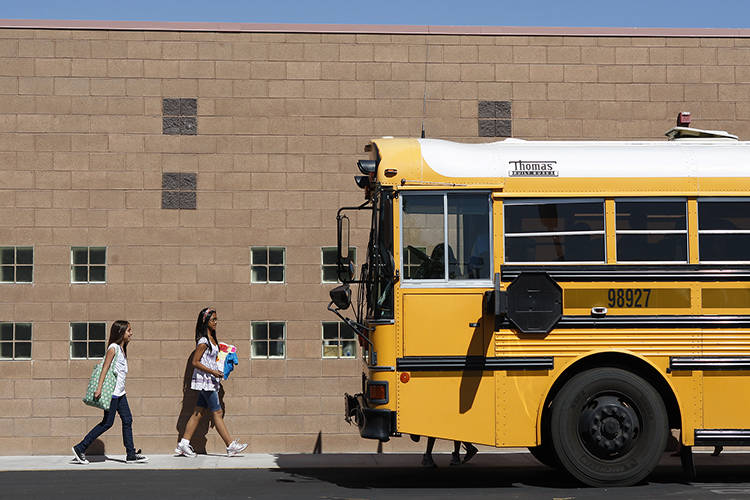COMMENTARY: Districts still have obligations to disabled Nevada students

Forty-five years ago, on Nov. 29, 1975, the Individuals with Disabilities Education Act (IDEA) was signed into law. As we celebrate this milestone, students who receive special education services face a situation unlike at any time in the four and half decades since the law was signed.
None of the parents, self-advocates and educators who fought for special education services on that day imagined the challenges to a “free appropriate public education” from a pandemic. Over the past nine months, the challenges schools have faced because of COVID-19 have created uncertainty for families of children throughout Nevada, especially those with disabilities.
Educators and parents alike are faced with difficult choices and must weigh the risk of contracting COVID-19 over going back into the school building. A significant number of students with disabilities are at greater risk for COVID. Virtual learning and other social distancing measures as recommended by the Centers for Disease Control and Prevention and other experts must be in place to ensure the safety of students with disabilities and school personnel.
The foundation of IDEA is to develop an individualized educational program that meets each student’s unique needs. In addition, Nevada statutes and administrative code include standards for special education. School districts across Nevada have implemented their own reopening plans and taken different approaches for the roughly 63,000 students with disabilities in our state.
Our focus is not on a call to re-open schools or for a one-size-fits-all approach. Instead, our emphasis is that students with disabilities should be provided quality services that meet their educational needs. Ultimately, IDEA is not in lockdown. The obligation of school districts to provide services to students with disabilities has not decreased and continues without any change.
Last month, the Nevada Department of Education’s Office of Inclusive Education created guidance to assist districts in their responsibilities under IDEA during the pandemic. The guidance identifies that “it is uncontroverted that the mandates of the IDEA and (Nevada law) must drive all decision-making with regard to the provision of a free appropriate public education to each student with a disability during these unprecedented times.”
Unfortunately, our organizations have heard too many stories related to the lack of access to federally mandated services and supports outlined on each child’s individualized education program. School districts must ensure their commitment to the law or students will continue to be denied access to the general education curriculum, specialized instruction, related services, adaptive equipment, assistive technology and effective communication supports.
With the pandemic continuing into the foreseeable future, our organizations recommend the following:
— Value creativity and collaboration to ensure compliance and quality support services: When educational services are not working, schools must make sure that students with disabilities do not bear the consequences. If virtual learning is not effective, schools will need to be creative and collaborate with parents to meet the individualized needs of students. Regular communication among parents, students and educators is essential to address concerns.
— Ensure compensatory services: School districts should take affirmative steps to ensure compensatory education for all students with disabilities. Whether remote or hybrid learning, quality and accessible education is necessary to include ample direct instruction. Under IDEA, children with disabilities are eligible for compensatory services to make up for any failures to provide an appropriate education.
— Protect civil rights and access to dispute resolution mechanisms: Civil rights of students with disabilities and their families remain in place. Schools must continue to honor these rights and offer the related services, instruction and accommodations. The options under IDEA to resolve disputes also remain in place — mediation, state complaint and due process complaint procedures should be accessible to parents.
— Enhance policies to have consistency related to workload, homework submission and attendance: The transition to virtual and hybrid learning has been an incredible challenge for families and students. Over the past nine months, students have often been punished for circumstances beyond their control. Policies that are tailored to support students during this time will improve overall performance and reduce stress.
— Use compassion: Lastly, a compassionate approach can produce meaningful educational outcomes. With the substantial impact of a pandemic that has resulted in loss for far too many and placed some of the most vulnerable in our community in danger, an effort to exercise compassion is essential for students and educators.
Ultimately, at the end of each school day, if we are able to work together as a team and as a community, our students will both continue to receive a quality education and remain safe from the virus.
— Karen Taycher is executive director of Nevada PEP; Tamika Shauntee is legal advocacy coordinator for the ACLU of Nevada. This essay was also signed by Jack Mayes, executive director of the Nevada Disability Advocacy and Law Center, and Alex Cherup, staff attorney for Nevada Legal Services.